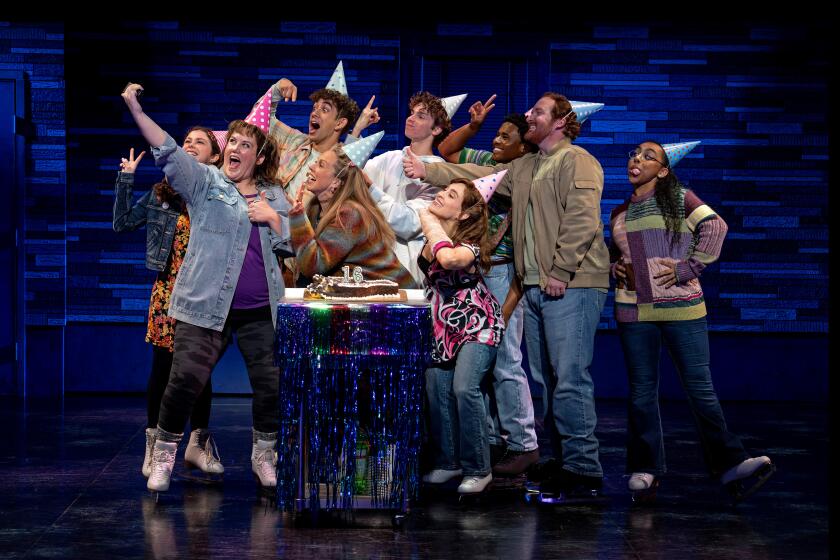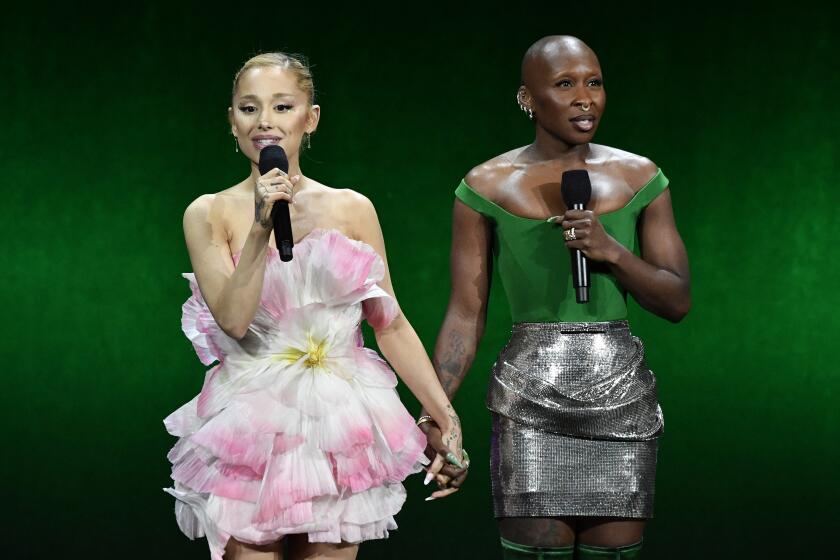COMMENTARY : A Tale of Two Operatic Musicals
Broadway wants to be operatic these days. The music--not the play--is the thing, or so they say.
Last year’s big British imports, the high-tech extravaganza “Starlight Express” and the hyper-banal “Les Miserables,” insist on telling their stories with songs instead of spoken words. “Cats” had done the same.
“The Phantom of the Opera,” this year’s British mega-hit (it just received 10--count ‘em, 10--Tony nominations), deals directly and indirectly with the bizarre theatrical nature of the lyric muse. And now there is “Carrie.”
Under normal conditions, the numbing, glitzy, careening ineptitudes of “Carrie” might not attract the interest of a music critic. But this stranger from another paradise happened to read an interview in the local paper in which the composer, Michael Gore of “Fame” fame, and the lyricist, Dean Pitchford of “Footloose,” invoked some rather lofty, contextually startling inspirations.
The idea of making a musical of Stephen King’s nifty gothic-horror tale of telekinetic revenge came to the authors in a flash, it was reported, as they walked home late one night after seeing Alban Berg’s “Lulu” at the Met. Perhaps they should have just taken some warm milk and gone to bed.
Talk about opening Pandora’s box. Somehow Berg’s daringly atonal, magnificently decadent, decayingly romantic, ultimately heroic translation of Wedekind had paved the way for a bloody, piddling, incoherent, $7-million show in which the irrelevant, overmiked, do-it-by-the-numbers score vacillates between Muzak, bubble-gum pop and rocky out-takes from a would-be sequel to “Grease.”
The music/babble ratio here, not incidentally, is 70-30. It hardly matters.
For all its staggering popularity, “Phantom” actually may not be the greatest music drama in the history of Western civilization. Although Andrew Lloyd Webber can write remarkably clever, fuzzily satirical pastiches of Puccini, Massenet, Offenbach and Rossini, he tends to get bland and mushy when he has to write music for himself.
The basic problem here does not concern the often-charged crime of tune borrowing. Beethoven, after all, borrowed from Mozart. Strauss borrowed from Wagner. Lloyd Webber’s problem really concerns his inability to do anything individual with his recycled material.
Certain aspects of the lavish Broadway production disorient a would-be serious listener. The ubiquitous microphones, on stage and in the pit, make everything sound bigger if not better than life. The amplification scheme also makes everything sound canned, and some things actually are. Lip-syncing is permitted.
One doesn’t always know where, or whom, the voices are coming from. Echoes are added to the sound track for dramatic punctuation. Michael Crawford, the titular quasi-hero, spends a lot of time emitting croons and whispers that emerge as shouts. Sarah Brightman, a.k.a. Mrs. Lloyd Webber, sings her high and florid music with a breathy peep that the engineers turn into a Nilssonesque shriek.
The best vocalism comes from Judy Kaye as the Italian diva whom Brightman supplants as the belle of the Paris Opera. (Ironically, the Tony nominators snubbed the imported ingenue while they gave Kaye the nod for best supporting performance in a musical.) Kaye doesn’t just sing with wit and point; she also musters a delicious caricature of Renata Scotto’s icy sweetness.
David Romano attempts a comparable in-joke as a tenorissimo who vaguely resembles that fellow who likes to wave a white table-cloth during intimate recitals in hockey rinks. Romano does look splendid in a dizzily ornate costume modeled, no doubt, on what Caruso wore as Radames in the “Victor Book of the Opera.” Unfortunately, the Angeleno’s top voice seems to be betraying the strain of eight performances a week.
That, of course, is a relatively minor matter. The ghostly operatic show is bigger than its parts. It remains, above all, a triumph of modern stagecraft. And compared to the latest competition, it is a grand and glorious, super-duper-masterpiece.
Put it this way: “Phantom” is to “Carrie” what the “Nibelungen Ring” is to the “Rinso-White” song.
More to Read
The biggest entertainment stories
Get our big stories about Hollywood, film, television, music, arts, culture and more right in your inbox as soon as they publish.
You may occasionally receive promotional content from the Los Angeles Times.










